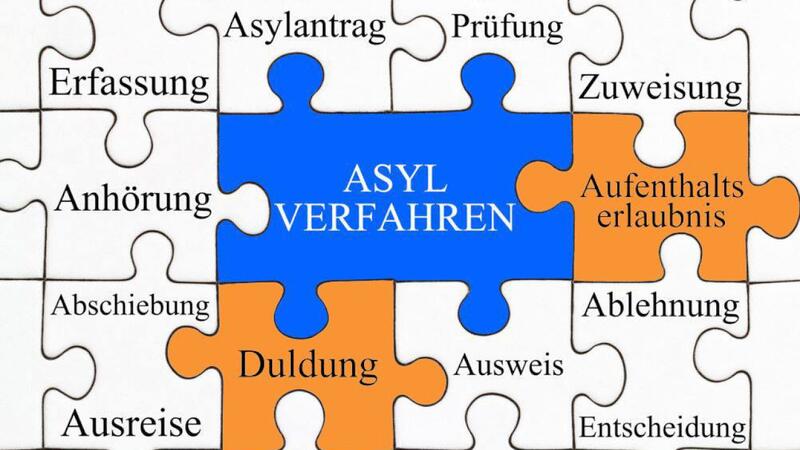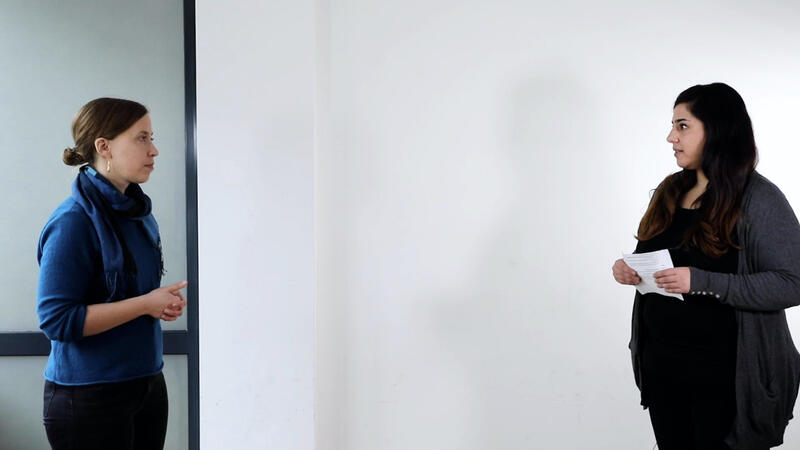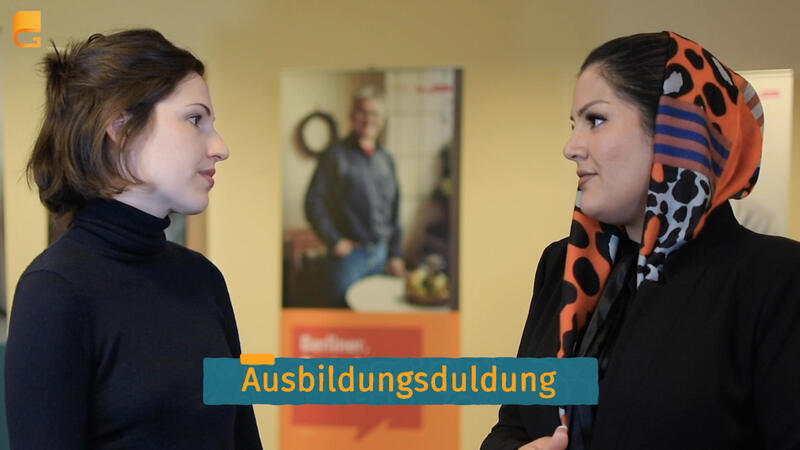"Chancen-Aufenthaltsrecht"
Can the new law help me obtain a secure residence permit?
The new "Chancen-Aufenthaltsrecht" (roughly: Opportunity Residence Act) stipulated in §104c Residence Act has come into force on 31 December 2022. It stipulates issuing a residence permit for 18 months and only those who currently have a “Duldung” or “Duldung Light” can apply for it.
The new law applies to people who have been in Germany for five years with a "Duldung" (Tolerated Stay Permit) or "Aufenthaltsgesstattung" (Temporary Residence Permit), have not committed a criminal offence and profess the German constitution. During these 18 months, the person should try to meet the requirements for a permanent right to stay, in particular, per § 25a and 25b Residence Act. If they fail, they will be issued a "Duldung" again.
Important: If you are in Germany with a tolerated stay permit or “Duldung”, you should seek advice whether a residence permit under §25a or §25b of the Residence Act could also be an option for you. In order to be granted the right to stay according to this new law, you must meet certain requirements. You can learn about these requirements in our chapter "Residence rights for individuals with ‘Duldung’".
What do I need to know?
The new law (“Chancen-Aufenthaltsrecht”) applies to those who currently have a “Duldung” or “Duldung Light”.
Furthermore, you must have been living in Germany for five years by October 31, 2022 (i.e., at the latest since October 31, 2017). During these five years, you must have resided in Germany without any major interruptions with a
- Duldung or "Duldung light",
- Temporary residence permit ("Aufenthaltsgestattung“) or
- Residence permit („Aufenthaltserlaubnis “).
Only then can you apply for the right of residence according to the “Chancen-Aufenthaltsrecht”.
You must not have committed an intentional criminal offence above certain limits (prison sentences or fines equalling 51 daily rates or more or criminal offences punishable by 91 daily rates or more for criminal offences under the Residence or Asylum Act) during this time. You must also comply by the free and democratic order.
You can apply for this right of residence (per § 104c residence Act) at your responsible Immigration Office. It will be valid for 18 months and will not be extended under any circumstances.
Important: The free democratic rule of law (“freiheitlich demokratische Grundordnung”) is enshrined in the German constitution (“Grundgesetz”), which defines the basis for peaceful coexistence in Germany. It also recognises and endorses democracy as a political form of government. Some Immigration Offices may ask questions during your appointment to ensure you adhere to the law. It, therefore, makes sense to prepare yourself so that you can answer these questions well. You can read the information sheet published by the Wittmund district to learn more.
Yes. Verifying your identity is not among the requirements for a so-called „Chancen-Aufenthaltsrechts“ per § 104c Residence Act. People whose identity has not been officially verified (i.e., those who have been issued a so-called "Duldung Light" under Section 60b of the Residence Act can also apply. You can learn more in our "Duldung Light" chapter. The time during which you were living with a "Duldung Light" will also be considered when calculating the 5-year stay requirement.
Important: To ultimately obtain a Residence Permit per § 25a or 25b Residence Act, you have 18 months to prove your identity AND present a passport or a substitute ID card (for instance, travel document for foreign nationals). If you cannot do so, you must prove that you have made an effort and taken the necessary and reasonable steps to have your identity verified. Check out our "Duldung Light" chapter to find out what "necessary and reasonable steps" means in the paragraph "How can I prove that I have tried to obtain a passport?". Also, you can learn what kind of cooperation for acquiring a passport the immigration authorities can demand from you and what consequences the procurement of a passport can have for you.
It is very difficult or even impossible for some people to obtain a passport. It is, therefore, vital to seek specialised advice for your specific case. A counselling centre or a law firm can advise you on what to do. Please note that consultation with a law firm could be quite costly. You can find counselling centres nearby on our Local Information page. Enter the name of the city where you live and search for asylum, residence or legal advice centres.
The new law applies to those who have lived in Germany for five uninterrupted years; however, if you have only left Germany for a short time, you can still apply for this new form of right of residence. "Short time", according to the new law, refers to interruptions of stay lasting no longer than three months. What is crucial is that you have never moved your primary place of residence to another country (for instance, by cancelling the contract on your flat).
The following individuals cannot apply for the so-called Opportunity Right of Residence:
- The person has been sentenced to imprisonment or fines equal to 51 or more days of incarceration. This also applies to those who have committed criminal offences subject to a sentence of 91 or more daily rates under the Asylum and Residence Act, if the crime is committed intentionally.
- The young person has been sentenced to detention in a Youth Detention Centre ("Jugendstrafanstalt ") under juvenile criminal law. However, if you, for instance, were in juvenile detention ("Jugendarrest"), you can apply for the so-called Opportunity Residence Permit.
- Persons who have repeatedly and intentionally provided false information about their identity or nationality and by doing so prevented their deportation will not be eligible for the so-called Opportunity Residence Permit. But if you now provide the Immigratoin Office the correct information about your identity, you may be able to benefit from “Chancen-Aufenthaltsrecht” after all.
NO. You cannot be deported during the 18 months your residence permit is valid.
If you meet the requirements, your spouse or life partner, your minor single children and maybe also your older children can be granted the right of residence. Your partner or children do not have to have lived in Germany for five years. However, the following requirements must all be met:
- Your spouse or partner and your children must live with you in the same flat.
- Your spouse, life partner, and children must not have committed a criminal offence.
- Your spouse or life partner and your children must not have ever prevented their deportation by repeatedly and intentionally providing false information about their identity and nationality.
- Your spouse, life partner, and children must acknowledge the free democratic order.
Important: Your adult child can also obtain the right of residence. However, this is only possible if they live in a flat with you, are not married and were underage (i.e., under 18 years of age) when they entered Germany.
You must apply for the so-called Opportunity right of residence at your responsible Immigration Office, preferably in writing. Ask whether there is a special form you must fill up and what evidence you need to provide. If you meet the requirements, the immigration authorities usually issue you with a residence permit. Since the right of residence (§104c Residence Act) is a directory provision, the immigration authorities may refuse to grant a residence permit in exceptional cases. However, the immigration authorities must justify why the Immigration Office believes that your case counts as an exceptional case. You can appeal or file a lawsuit if the Immigration Office rejects your application.
If you have issues with your application, you can seek advice. You can find counselling centres in your area on our Local Information page. Enter the name of the city where you live and search for asylum, right of residence or legal advice centres.
If you get a so-called Opportunity Residence Permit or "Chancen-Aufenthaltsrecht", you will receive a residence permit for 18 months per §104c Residence Act. You cannot extend this residence permit – you can only apply for and receive it once.
Please note: As the Immigration Office hand you this resident permit (at the latest), they should also inform you about what you need to do to be granted a residence permit after 18 months when your "Chancen-Aufenthaltsrecht" expires.
It is particularly important to clarify when the application for the subsequent residence permit (§ 25a and § 25b Residence Act) can and must be filed at the earliest so that there are no gaps in the legal residence.
Yes – you are allowed to work as an employee, become self-employed or work for a temporary employment agency.
If you, as a person with a “Duldung”, faced work prohibition (“Beschäftigungsverbot”) and were therefore not allowed to work before, the prohibition will no longer apply once you are granted “Chancen-Aufenthaltsrecht”. However, to be on the safe side, you should also inquire about it at your Immigration Office when you are handed the residence permit and make sure the work permit is also included.
You will find more information on the right to work on your residence permit or in a supplementary sheet handed to you along with the residence permit. In our WORK category, you will find various chapters with essential information about working in Germany. For many professions in Germany, you must have your qualifications recognised before you can work. You will find out more in our chapter Recognition of foreign qualifications.
Important: Please ensure that you have received an employment contract before starting a job. Otherwise, your employment will be considered illegal, which can have severe disadvantages for you. You can learn more about it in our chapter, Illegal Employment ("Schwarzarbeit").
What comes after "Chancen-Aufenthaltsrecht " expires?
There can be some requirements you have to meet, which may depend on your age.
Apart from that, you can apply for a residence permit per §25b Residence Act regardless of your age if you meet ALL the following requirements:
- You must speak German at level A2. There are exceptions in the case of illness, disability or age.
- Your livelihood is mostly secured – that means your income will cover at least 51 per cent of your expenses. Or your livelihood is secured for the foreseeable future, for example, because you are still in vocational training or studying and have good prospects of a permanent job.
- You have obtained a school or vocational qualification in Germany. Or you have passed the "Leben in Deutschland" test. This test is an examination required for granting a residence permit according to Section 25b of the Residence Act – you must pass it IF you have not completed school or vocational qualifications in Germany. It provides you with general knowledge about history, politics and society in Germany. You can prepare yourself for the test online.
- If you have school-age children, they must attend school.
- You must have a passport or a substitute ID card. Your identity must have been verified – or you must be able to demonstrate that you have done everything objectively possible and subjectively reasonable to verify your identity, but have not received a passport. You can find out more in our "Duldung light" chapter in the paragraph "How can I prove that I have applied for a passport?".
- You must not have committed any crimes that can be a reason to justify your deportation from Germany. You must also not have been sentenced to a prison sentence of six months or more or a youth penalty (“Jugendstrafe”) of one year or more, which is not suspended and must be carried out.
- If your spouse or life partner and your children live in the same flat with you, they can receive a residence permit under certain conditions.
According to §25b Residence Act, the residence permit is granted for two years and can be extended.
If you are between 14 and 26 years old, you can obtain a residence permit according to §25a Residence Act. At the time of application, you must meet the following if you meet the following conditions:
- You attended school in Germany for three years with success. That means you have graduated to go to the next higher class every year. Or you can provide evidence of a school or vocational qualification acquired and recognised in Germany.
- If you attend school, university or a vocational training programme, you can benefit from state aid without it being a hurdle for obtaining a residence permit per §25a of the Residence Act (e.g. BAföG or vocational training allowance). In all other cases, the Immigration Office decides, for example, on the basis of proof of income, whether the livelihood is sufficiently secured in each individual case. Here the immigration authorities have a certain amount of leeway when it comes to humanitarian residence permits.
- You must have a passport or a substitute ID card. Your identity has been verified by the authorities, or you have demonstrated that you have done everything objectively possible and subjectively reasonable to have your identity verified but failed to obtain a passport. You can learn more about this in our "Duldung light" chapter in the paragraph "How can I prove that I have tried to obtain a passport?".
- Your family, i.e. your parents, minor siblings, spouse or life partner or your children, can also receive a “Duldung” or residence permit under certain conditions.
The residence permit per §25a Residence Act is granted for up to three years and can be extended.
Important: If you have mental or physical disabilities, you will face less strict regulations.
No – you must first obtain one of these specific forms of residence permit. If you meet the requirements for another residence permit, it can only be granted to you afterwards if applicable.
Make sure to seek advice! A specialised counselling centre or law firm can advise you on what best to do. If you have issues with your application, you can seek advice. You can find counselling centres in your area on our Local Information page. Enter the name of the city where you live and search for asylum, right of residence or legal advice centres.
If you do not meet the requirements for a residence permit after 18 months, you will revert to the "Duldung" status, if you still meet the requirements for a “Duldung”. Make sure you seek advice from a counselling centre or lawyer early on.
Important
If you have been in Germany with "Duldung" for less than five years, you can apply for a residence permit per Section 25a or Section 25b of the Residence Act. You can learn more about it in our chapter "Residence rights for individuals with 'Duldung'".










